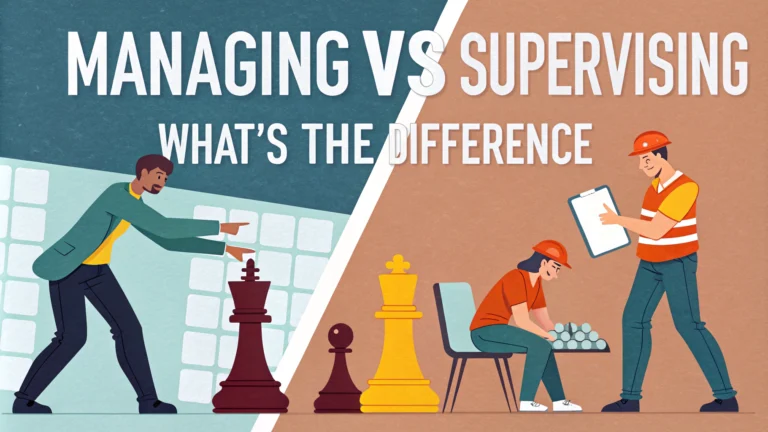The terms managing and supervising often get used interchangeably, but they represent distinct leadership roles with different responsibilities and skill requirements. Understanding these differences helps professionals navigate their career paths and develop the right skills for each position.
While **supervisors** focus on day-to-day operations and direct oversight of employees, **managers** take on broader strategic responsibilities and organizational planning. This quick guide breaks down the essential differences between these roles to help you understand their unique demands and requirements.
Core Responsibilities and Authority Levels
**Managers** typically hold higher authority and handle:
- Strategic planning and goal setting
- Budget control and resource allocation
- Policy development and implementation
- Department coordination and cross-functional leadership
**Supervisors** focus on:
- Daily task oversight and scheduling
- Employee training and guidance
- Performance monitoring
- Direct team support and problem-solving
Required Skills and Competencies
Each role demands specific skill sets:
| Manager Skills | Supervisor Skills |
|---|---|
| Strategic thinking | Technical expertise |
| Financial planning | Team coordination |
| Business development | Direct training ability |
| Change management | Performance assessment |
Decision-Making Scope and Impact
The decision-making authority varies significantly between roles. **Managers** make long-term, strategic decisions that affect entire departments or organizations. **Supervisors** handle immediate operational decisions within established guidelines.
“Management is about doing things right; leadership is about doing the right things.” – Peter Drucker
Career Growth and Development Paths
The progression from supervisor to manager requires specific steps and skill development:
- Advanced education or certifications in business management
- Cross-functional project experience
- Leadership training programs
- Mentorship opportunities
Communication and Team Dynamics
**Managers** communicate through formal channels and focus on organizational messaging. **Supervisors** maintain direct, daily communication with team members.
| Manager Communication | Supervisor Communication |
|---|---|
| Department-wide updates | One-on-one guidance |
| Strategic presentations | Task instructions |
| Stakeholder meetings | Team briefings |
Performance Metrics and Evaluation
Different roles require different measurement approaches:
Manager Metrics
- Department productivity rates
- Budget management
- Strategic goal achievement
- Team retention rates
Supervisor Metrics
- Team efficiency
- Quality control metrics
- Training completion rates
- Individual performance reviews
Building Success in Leadership Roles
Success in either role depends on adapting leadership styles to position requirements and team needs. Focus on developing relevant skills and maintaining clear communication channels.
“The best leaders are those most interested in surrounding themselves with assistants and associates smarter than they are.” – J.C. Penney
Key takeaways for success:
- Understand role boundaries and responsibilities
- Develop appropriate skills for each position
- Maintain clear communication channels
- Focus on continuous learning and improvement
Frequently Asked Questions About Managing vs Supervising
General FAQs
Q: What is the main difference between managing and supervising?
A: Managers focus on strategic planning and organizational direction, while supervisors handle day-to-day operations and direct oversight of employees. Managers typically have higher-level responsibilities including budgeting, hiring, and policy-making.
Q: Does a supervisor report to a manager?
A: Yes, supervisors typically report to managers in the organizational hierarchy. Supervisors act as a bridge between frontline employees and management.
Q: Which role has more authority – manager or supervisor?
A: Managers have more authority and decision-making power than supervisors. They control larger budgets, make strategic decisions, and often oversee multiple supervisors.
Long-tail Keyword FAQs
Q: What skills do you need to move from supervisor to manager?
A: Key skills include:
- Strategic thinking and planning
- Financial management
- Leadership development
- Project management
- Business communication
Q: What is the salary difference between managers and supervisors?
A: Managers typically earn 30-50% more than supervisors. The exact difference varies by industry, location, and company size.
Q: Can you be a supervisor without management experience?
A: Yes, many supervisory roles are entry-level leadership positions that serve as stepping stones to management. Technical expertise and team leadership skills are often sufficient initial qualifications.
Q: What level of education is needed for managing vs supervising?
A: Management positions often require bachelor’s or master’s degrees, while supervisory roles may require only associate degrees or relevant experience.
Q: How many employees do managers vs supervisors typically oversee?
A: Supervisors usually oversee 5-15 direct reports, while managers may oversee multiple departments with 20-100+ total employees through their supervisors.
Q: What are the key responsibilities that separate managers from supervisors?
Managers:
- Strategic planning
- Budget control
- Policy development
- Organizational growth
Supervisors:
- Daily operations
- Employee scheduling
- Performance monitoring
- Task delegation
Q: Is supervisor experience required to become a manager?
A: While supervisory experience is valuable, it’s not always required. Some professionals move directly into management roles through education, specialized skills, or leadership potential.
| Aspect | Manager | Supervisor |
|---|---|---|
| Focus | Strategic | Tactical |
| Time Frame | Long-term | Short-term |
| Authority Level | High | Medium |



















